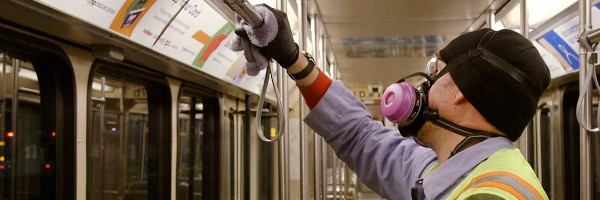Transit Response: Difference between revisions
No edit summary |
No edit summary |
||
| (6 intermediate revisions by the same user not shown) | |||
| Line 1: | Line 1: | ||
__NOTOC__ | |||
{{COVID-19 | {{COVID-19 | ||
| title = Transit Response | | title = Transit Response | ||
| team = TriMet | | team = TriMet | ||
| leader = Wilfred Pinfold | | leader = Wilfred Pinfold | ||
| image = TRIMETCOVID19.jpg | | image = TRIMETCOVID19.jpg | ||
| imagecaption = Preventing the spread of COVID-19 is a team effort. | | imagecaption = Preventing the spread of COVID-19 is a team effort. | ||
| municipalities = Independence OR | | municipalities = Independence OR | ||
| chapter = Business Continuity | |||
| contributors = | | contributors = | ||
| website = | | website = https://transitcenter.org/tag/covid-19/ | ||
| download = | | download = How Much Service did the Largest Transit Agencies Run in 2021.pdf | ||
| description = | | description = | ||
Cities and states are acting to slow progress of the COVID-19 pandemic by shuttering all nonessential businesses, closing schools, and urging residents to hunker down at home. As a result, ridership has fallen off for many mass transit systems across the country — light rail, streetcar, buses and ferries — as officials work to keep service running. | Cities and states are acting to slow progress of the COVID-19 pandemic by shuttering all nonessential businesses, closing schools, and urging residents to hunker down at home. As a result, ridership has fallen off for many mass transit systems across the country — light rail, streetcar, buses and ferries — as officials work to keep service running. | ||
}} | |||
But as the COVID-19 cases climb, transit workers become ill, service reductions become necessary. How should transit authorities respond to protect their employees while continuing to respond to the transit needs of vulnerable communities. | But as the COVID-19 cases climb, transit workers become ill, service reductions become necessary. How should transit authorities respond to protect their employees while continuing to respond to the transit needs of vulnerable communities. | ||
| Line 28: | Line 27: | ||
Bay Area Rapid Transit's communications around COVID-19 have emerged as an invaluable resource for the media, riders, and elected leaders to learn about the crisis facing transit. | Bay Area Rapid Transit's communications around COVID-19 have emerged as an invaluable resource for the media, riders, and elected leaders to learn about the crisis facing transit. | ||
[https://transitcenter.org/tag/covid-19/ Weblink] | [https://transitcenter.org/tag/covid-19/ Weblink] | ||
Latest revision as of 06:39, January 22, 2024
| Transit Response | |
|---|---|

| |
 Preventing the spread of COVID-19 is a team effort. | |
| Team Organizations | TriMet |
| Team Leaders | Wilfred Pinfold |
| City, State | Independence OR |
| Contributors | |
| Website | Website |
| Document | Download |
Description
Cities and states are acting to slow progress of the COVID-19 pandemic by shuttering all nonessential businesses, closing schools, and urging residents to hunker down at home. As a result, ridership has fallen off for many mass transit systems across the country — light rail, streetcar, buses and ferries — as officials work to keep service running.
But as the COVID-19 cases climb, transit workers become ill, service reductions become necessary. How should transit authorities respond to protect their employees while continuing to respond to the transit needs of vulnerable communities.
Challenges
- Protecting Transit employees.
- Providing transit services to low income and vulnerable communities.
- Limit the deployment of mass transit vehicles on routs with few riders while maintaining responsive services.
Implementation
Bay Area Rapid Transit's communications around COVID-19 have emerged as an invaluable resource for the media, riders, and elected leaders to learn about the crisis facing transit. Weblink